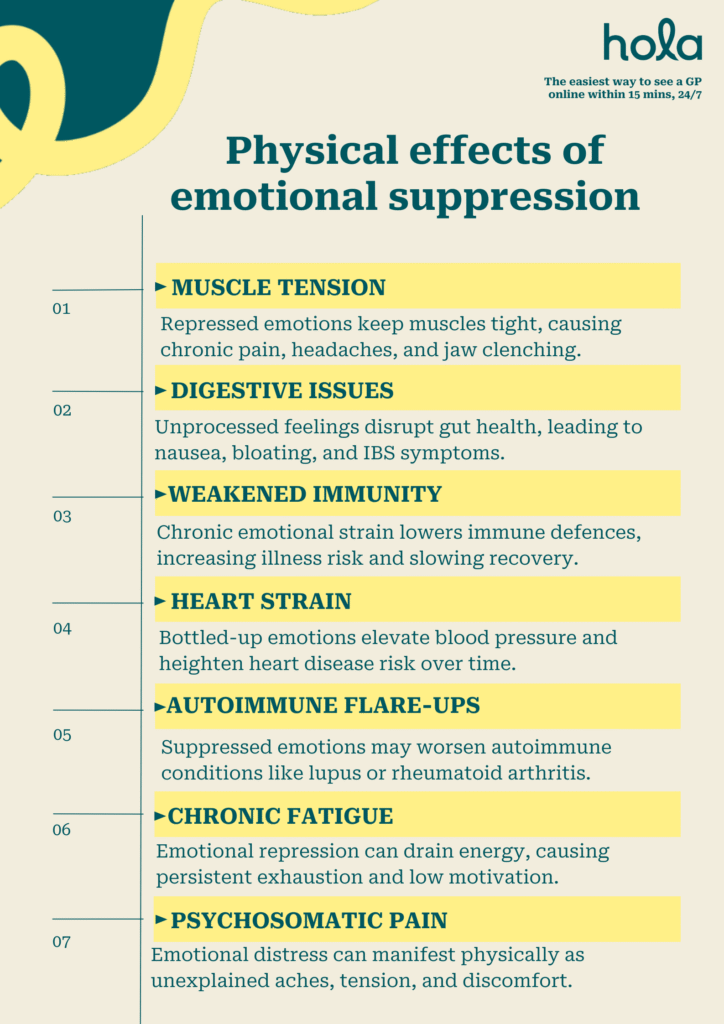How emotional suppression affects your body
Written by editorial staff writer at Hola. Medically reviewed by Amira Shah, MA in Counselling Psychology, Registered Psychotherapist.

Contents

What is emotional suppression?
Emotional suppression involves holding back or bottling up your emotions, either intentionally or unintentionally, without realising it. It means not expressing or experiencing emotions like anger, despair, frustration, nervousness, or even joy openly or healthily.Overview of the mind-body connection
The mind-body connection refers to the significant association between our mental and physical well-being. Our thoughts, feelings, and stress can have a direct impact on how our body feels and operates. For instance, anxiety can lead to headaches or gastrointestinal problems, while prolonged stress can undermine the immune system. Likewise, physical issues such as pain or illness can affect mood and mental health. This relationship underscores the necessity of addressing mental and physical health simultaneously, as supporting one often benefits the other.Emotional suppression vs. emotional regulation
Emotional suppression and emotional regulation represent two distinct methods of managing emotions.- Emotional suppression involves burying emotions or disregarding them rather than expressing or addressing them. Over time, this can result in stress, tension, and mental health challenges, as unprocessed emotions may accumulate.
- Emotional regulation is the constructive approach of recognising, comprehending, and healthily managing emotions. It enables appropriate expression of feelings and effective coping, fostering emotional and physical wellness.
Ready for positive change? Start your mental health care plan here.
Examples of what suppression looks like in daily life
Instances of emotional suppression in everyday life include:- Putting on a smile or stating “I’m fine” when you’re upset or stressed.
- Avoiding difficult conversations to maintain harmony, even when something is bothering you.
- Occupying yourself with work, food, or screens instead of confronting your emotions.
- Refraining from tears or anger in situations where it would be safe to express those feelings.
- Downplaying your emotions by thinking “others have it worse” or “it’s not a big deal.”
- These behaviours may seem beneficial but can ultimately lead to emotional exhaustion over time.
Also read: Emotionally unavailable: Meaning & spotting the signs
How the brain and nervous system process emotions.
The brain and nervous system collaborate to process emotions through a sophisticated network. When an emotion is experienced, the amygdala, an area of the brain that identifies threats, quickly reacts by sending signals to other regions like the hypothalamus and autonomic nervous system. This may trigger physical responses such as a rapid heartbeat or tight muscles. Simultaneously, the prefrontal cortex aids in interpreting the emotion and determining how to react. This region is crucial for emotional regulation, guiding you to think before acting. The nervous system, particularly the sympathetic (fight-or-flight) and parasympathetic (rest-and-digest) systems, plays a significant role in how the body responds to and recovers from emotional events. Together, these systems enable you to experience emotions, comprehend them, and respond physically, whether calming down, taking action, or communicating with others.What happens physiologically when emotions are ignored
When emotions are overlooked or suppressed, the body can respond in a manner that impacts both physical and mental health. Physiologically, the brain continues to recognise the emotional signal, but rather than being processed and released, it remains unresolved, perpetuating a subtle state of stress in the body. The amygdala may remain activated, transmitting stress signals through the hypothalamus to the autonomic nervous system, particularly the sympathetic (fight-or-flight) system. This can result in a heightened heart rate, muscle tension, rapid breathing, and elevated cortisol levels. Ongoing emotional suppression might also weaken the immune system, disrupt sleep, and lead to problems such as anxiety, depression, digestive disturbances, and headaches. The body frequently retains unprocessed emotions, which may manifest as unexplained pain or tension. Ignoring emotions does not eliminate them; rather, it can quietly strain your health until they are recognised and dealt with.Physical effects of emotional suppression
Repressed emotions often keep the body in a sustained state of stress, increasing cortisol levels and compromising the immune system, making you more susceptible to illness. Additional physical repercussions might involve high blood pressure, sleep disruptions, and unexplained aches or pains. Over time, the body internalises what the mind avoids, frequently indicating distress through physical discomfort:- Muscle tightness and chronic discomfort: Repressing emotions can result in physical tightness in the body, particularly in areas like the jaw, neck, shoulders, and back. This may lead to chronic discomfort, jaw clenching, tension headaches, and migraines. When emotions are suppressed, the body remains stressed, keeping muscles tense and sore.
- Digestive disturbances: Emotional suppression impacts gut health due to the strong connection between the brain and the digestive system. Stress and unexpressed feelings can trigger or exacerbate symptoms such as indigestion, nausea, bloating, and irritable bowel syndrome (IBS).
- Compromised immune function: Long-term stress from unprocessed emotions can impair the immune system. This increases the body’s vulnerability to infections and slows the healing process. Over time, continuous emotional strain can keep the immune system weakened, leading to more frequent illnesses.
- Heart health and elevated blood pressure: Studies indicate that prolonged emotional repression is associated with high blood pressure and a higher risk of heart disease. Keeping emotions bottled up can create chronic strain on the cardiovascular system, which stresses the heart over time.
- Chronic health issues associated with emotional repression: Unprocessed emotions may contribute to the development or worsening of several chronic health conditions.
-
- Autoimmune diseases like lupus or rheumatoid arthritis
- Chronic fatigue, characterised by persistent low energy and motivation
- Fibromyalgia, which involves widespread pain and sensitivity
- Psychosomatic symptoms, where emotional stress manifests as unexplained physical discomfort

Emotional suppression and mental health
Concealing emotions can adversely affect mental well-being by heightening feelings of anxiety, depression, and emotional detachment. Neglecting or dismissing feelings consistently makes it harder to manage stress and foster relationships with others. As time passes, this can diminish emotional strength, rendering daily hurdles more daunting and impacting overall health. Identifying and confronting repressed emotions is essential for sustaining good mental health.Best ways to process emotions
Healthy emotional processing involves:- Recognising your feelings without judgment
- Engaging in conversation with someone you trust or keeping a journal
- Practising mindfulness or breathing techniques
- Seeking therapy or joining support groups
- Utilising physical movement, art, or music as a means of expression
Also read: Why do I feel the need to distance myself from everyone?
When and why to consult a doctor online
You should seek online medical advice when emotional repression leads to ongoing physical symptoms such as pain, digestive issues, or fatigue, or if you are finding it difficult to cope with stress, anxiety, or mood fluctuations. Online doctors can evaluate your symptoms, develop treatment plans, and refer you to mental health specialists if necessary. Getting help early can prevent problems from escalating and provides easy access to care from the comfort of your home, making it easier to get the support you require.Conclusion:
Bottling up emotions might feel like staying in control, but your body knows better–it’s taking notes. Instead of pushing feelings inside, try releasing them bit by bit. Your mind, sleep, and gut will thank you. Feeling your emotions is one of the healthiest choices you can make.FAQs
What does emotional suppression mean?
Emotional suppression is the act of consciously or unconsciously holding back, avoiding, or pushing away your emotions rather than expressing them. It means not allowing yourself to acknowledge or express emotions like anger, sadness, fear, or even joy.How do I know if I’m suppressing my emotions?
Signs of emotional suppression include emotional numbness, conflict avoidance, recurring headaches or muscle tension, and always feeling like you must stay in control. You might also struggle to identify your emotions.What’s the difference between controlling and suppressing emotions?
Emotional control involves managing your emotions in a balanced and healthy manner. It means acknowledging emotions, understanding them, and responding calmly and appropriately rather than reacting impulsively. In contrast, emotional suppression is avoiding or pushing away emotions, often by denying their presence or refusing to experience them. Healthy emotional management encourages growth and stability, while suppression can lead to internal pressure and adverse effects on your overall health.What happens if you suppress your emotions for a long time?
Suppressing emotions over a long period can have serious consequences on mental and physical health. Psychologically, it can lead to anxiety, depression, mood swings, and a sense of emotional numbness or disconnection from others. Physically, it can contribute to chronic stress, leading to issues like headaches, stomach problems, high blood pressure, fatigue, or even heart problems. Suppressed emotions can also weaken your immune system and increase the risk of developing stress-related or autoimmune disorders. Over time, these unexpressed feelings may accumulate, causing emotional outbursts, burnout, or relationship struggles.Can I talk to an online doctor about emotional suppression?
Yes, you can talk to an online doctor or mental health professional about emotional suppression. Many telehealth platforms offer access to licensed therapists, counsellors, or psychiatrists experienced in addressing emotional and psychological concerns. They can assist you in recognising your emotions, creating effective coping strategies, and offering support if repressing your feelings is affecting your overall well-being. Look for platforms that specialise in mental health, such as Hola Health, or local telemedicine services in your area. If your symptoms are severe or disruptive, seeking professional help is necessary.What are the effects of emotional suppression?
Emotional suppression can negatively impact your physical and mental health. Mentally, it might contribute to anxiety, depression, emotional numbness, and challenges in maintaining healthy relationships. Physically, it can cause chronic stress, fatigue, body aches, digestive discomfort, and a weakened immune system. Over time, suppressed emotions may lead to unexpected emotional eruptions, passive-aggressive behaviour, and unhealthy coping strategies like binge eating or substance misuse. Long-term suppression may increase the risk of burnout, diminished self-worth, and stress-related illnesses. Expressing emotions in healthy ways is essential for well-being.Does suppressing emotions cause disease?
Yes, suppressing emotions over time can harm physical health. It keeps the body in a constant state of stress, which may compromise immune function and increase the risk of health issues like heart disease, high blood pressure, digestive issues, chronic pain, and psychological conditions like anxiety and depression. While emotional suppression may not be the direct cause, it can worsen or trigger health problems.How do you recover from emotional suppression?
Recovering from emotional suppression begins with acknowledging that your emotions are valid and worthy of attention, not dismissal. Here are the key steps:- Build self-awareness
- Allow yourself to feel
- Express emotions
- Practice mindfulness
- Challenge negative beliefs
- Seek support
- Be patient
When should I seek professional help for emotional suppression?
It’s important to seek professional help for emotional suppression if it starts affecting your daily life, such as causing chronic anxiety, low mood, strained relationships, physical health problems, or if you struggle to recognise or communicate your emotions. If suppressed emotions lead to overwhelming stress, emotional instability, or disruptions in work or social interactions, speaking with a therapist or counsellor can provide valuable support and guidance.Take control of your mental health. Begin your care plan now.
What we treat
- Cough
- Nausea & vomiting
- Fever
- Hayfever
- Fatigue
- Sore throat
- Acne
- Hair loss
- Gout
- Eczema
- Rosacea
- Sunburn
- UTI
- Erectile dysfunction
- Contraception
- Morning sickness
- Morning after pill
- Prostate health
- Anxiety
- Depression
- Stress
- Grief & loss
- Antidepressants
- Premature ejaculation
- Asthma
- Blood pressure
- Blood thinners
- Diabetes
- Cholesterol
- Migraines & headaches
- Allergies
- Body ache
- Heartburn & reflux
- Sleep disorder
- Pain relief
- Gastro
Related Articles
Disclaimer
This blog is for general informational purposes only and does not indicate that Hola Health provides all treatments or preventive measures mentioned. It is not intended to be a substitute for professional medical advice. Always seek the guidance of your doctor or other qualified health professional with any questions you may have regarding your health or a medical condition. For emergencies please immediately contact 000. Any medical topics discussed are intended to educate, not to imply availability through Hola Health.

Get affordable healthcare on your terms, with quick access to qualified, Australian-registered telehealth doctors & health practitioners, 24/7, 365 days a year. No more searching for ‘doctors near me‘ – Hola connects you instantly.
Address: 79 St Georges Terrace, Perth WA 6000


Hola Health App
Get affordable healthcare on your terms, with quick access to qualified, Australian-registered telehealth doctors & health practitioners, 24/7, 365 days a year. No more searching for ‘doctors near me‘ – Hola connects you instantly.
Call 000 for emergency or urgent medical help.
Address: 79 St Georges Terrace, Perth WA 6000
© Hola Health, a brand of Packapill Pvt Ltd


 Facebook
Facebook  X
X  Copy Link
Copy Link











